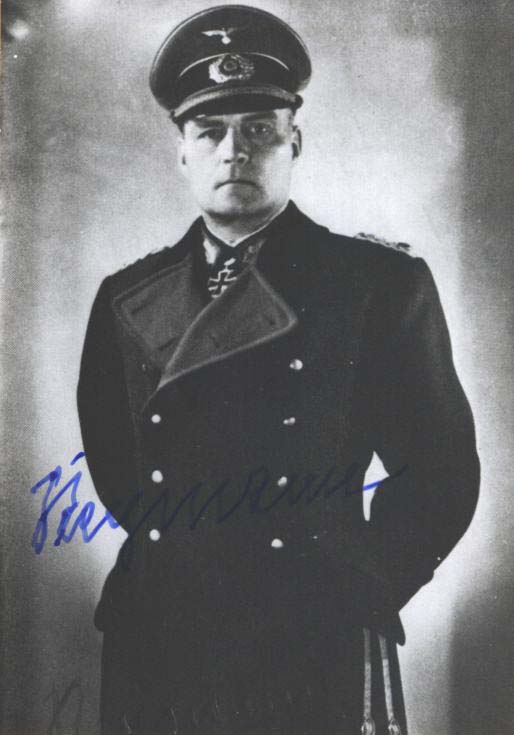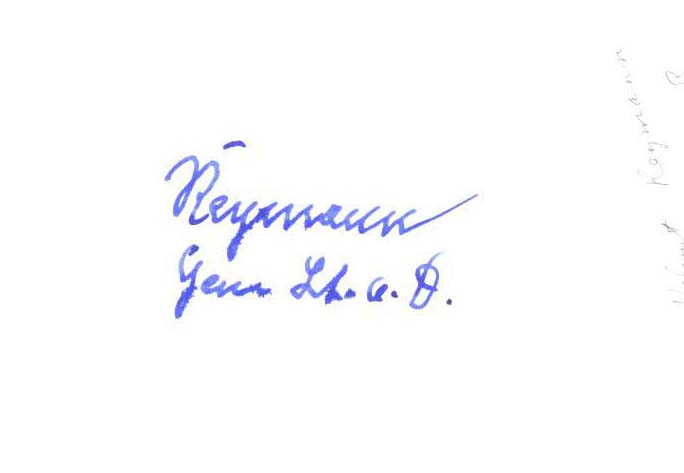

|
~SOLD~REYMANN Hellmuth
Generalleutnant
Reymann, Hellmuth
* 24.11.1892 Neustadt/Oberschlesien
+ 08.12.1988 Garmisch-Partenkirchen
Awarded Knights Cross: 05.04.1944
as: Generalleutnant Kommandeur 13./LwFeldDiv
Awarded Oakleaves as the 672nd Recipient : 28.11.1944 as Generalleutnant
Kommandeur 11.InfDiv
Born into a military family on 24 November 1892 in Neustadt / Upper Silesia. Joined Company of officer cadets in Legnica in 1909.
As a platoon leader with the 9th Company in August 1914, he entered WWI. He took part in the battles of Rossignol Tintigny, the battle of the Meuse and the Marne. He earned Iron Cross 2nd Class on 16 September 1914 and Iron Cross 1st Class 4 March 1915.
From 05 January 1917 to 29 May 1917 the regiment was employed in the East at Dvinsk and witnessed the beginning of the Russian Revolution. At that time
he was awarded the Knight's Cross of the Prussian Royal House Order of Hohenzollern with swords.
August & September, he experienced the trench warfare in the Upper Rhine, then the regiment was moved to Italy, where he took part in the battles on the Isonzo and through the Alps.
In addition, Reymann to February 1918 Deputy Adjutant on the staff of the 24th Infantry Brigade and then leader of the first battalion of his regiment.
At the end of the war the regiment was in Silesia, where after December 1918 was used as a border guard until the dissolution of the regimenT. He then joined for the Prussian police.
From July 1921 Reymann was police captain, and later department head at the police academy in Frankenstein / Silesia, where he stayed until 1928.
01 April 1932 made Major of Police.
Due to resizing of the past war army April 1935 he transferred to the Wehrmacht. 01 January 1936 when tactics instructor at the Military School, Dresden, was promoted to lieutenant colonel and on 26 November 1938 he was promoted to colonel.
During full mobilization on 26 August 1939 he remained in the west and took over in November the command of the infantry regiment of 205 (52nd Infantry Division), with whom he received again both Iron Crosses (1939 version this time.
After leading his men in the invasion of France he remained in Paris to June 1941 with his regiment, then was transferred to the Eastern Front. There he took part in the invasion of Russia where he was on 22 November 1941 awarded the German Cross in Gold.
From 1 October 1942 to 1 October 1943, Lieutenant-General Reymann commanded the 212th Infantry Division in northern Russia. His division was part of Army Group North. From 1 October 1943 to 1 April 1944, Reymann was transferred within Army Group North to command the 13th Air Force Field Division (13.Luftwaffe-Feld-Division). His command was part fighting in northern Russia. Reymann's division included the 25th Field Infantry Regiment, the 26th Field Infantry Regiment, and the 13th Field Artillery Regiment. The XXVIII Army Corps was attached to the 18th Army.
Reymann's 13th Air Force Field Division suffered heavy losses in the retreat from Leningrad where he was awarded the Knight's Cross. The division was disbanded in April 1944.
From 1 April 1944 to 18 November 1944, Reymann commanded the 11th Infantry Division in northern Russia. In October 1944, Reymann's division was encircled in Latvia with a large number of German units in what was to be known as the Courland Pocket. REYMANN was replaced by Lieutenant-General Gerhard Feyerabend and Reymann returned to Germany.
On 6 March 1945, Reymann was telephoned by Hitler's Chief Adjutant, General Wilhelm Burgdorf who informed him that Hitler had personally appointed him to command the Berlin Defense Area. Reymann was to replace General Bruno Ritter von Hauenschild immediately and to prepare for the impending Battle of Berlin.
When he entered Berlin, Reymann found that he had inherited almost nothing from his predecessor, von Hauenschild. After further investigation, Reymann realized that Hitler and Joseph Göbbels had ruled that any defeatist talk would lead to immediate execution. No plans were drawn to evacuate the children and the elderly. No food had been stored in case of an enemy siege. The blunt Reymann set to work regardless of these shortcomings. He did all he could to prepare the city for the imminent attack that the top Nazi leaders refused to acknowledge. Reymann was also a notable opponent of the destruction of Berlin's bridges. While destroying the bridges leading into Berlin could slow the Russian invasion, Reymann believed that, if the bridges were destroyed, it would also deprive the city of its electricity, water, and fuel. In Reymann's opinion, Berlin would starve and cease to exist as an influential city in Europe.
Prior to the encirclement of the city, Reymann reportedly urged Hitler to allow him to evacuate the underage population of Berlin. But he was rebuffed.
On 15 April, Reymann met with architect Albert Speer and General Gotthard Heinrici, Commander-in-Chief of Army Group Vistula, to discuss Hitler's scorched earth policy. While outwardly responsible for carrying out the decree, Speer was clandestinely campaigning against it. Although Reymann refused to side with Speer, he did promise to confer with Heinrici before destroying vital city infrastructure. Heinrici was also opposed to the scorched earth policy.
By 21 April, Joseph Goebbels, as Reich Commissioner for Berlin, ordered that "no man capable of bearing arms may leave Berlin." Only Reymann, as commander of the Berlin Defense Area, could issue an exemption. Senior Nazi Party officials, who readily condemned members of the army for retreating, rushed to Reymann's headquarters for the necessary authorizations to leave. Reymann was happy to sign over 2,000 passes to get rid of the "armchair warriors." Reymann's Chief-of-Staff, Hans Refior, commented: "The rats are leaving the sinking ship." Both Wilhelm Burgdorf and Joseph Goebbels convinced Hitler that Reymann was no good. When Reymann chose not to locate his office next to Goebbels' office, Goebbels held this act against him.
On 22 April, Hitler relieved Reymann of his command for his defeatism and replaced him with newly promoted Major-General Ernst Kaether. But, Kaether never took command. By the end of the day, Hitler personally took over command of the city's defenses. The result of all of this was that, when the first Soviet units entered the suburbs of Berlin, Hitler himself was in control of the city's defenses. One day later, on 23 April, Hitler changed his mind again and made Artillery General (General der Artillerie) Helmuth Weidling the new commander of the Berlin Defense Area. Weidling remained in command of Berlin's defenses to the end and ultimately surrendered the city to Soviet General Vasily Chuikov.
After his dismissal as the commander of the Berlin Defense Area, Reymann was given a weak division near Potsdam. The division was given the unlikely title of "Army Group Spree." Reymann played a role in the potential link-up between the defenders of Berlin and the relief forces of General Walther Wenck. While Wenck never made it to Berlin, he did make it to Potsdam. About 20,000 of Reymann's men were able to escape through the narrow opening made by Wenck's 12th Army. On 7 May 1945, he was a British POW released in September 1945. After the war he worked as a night watchman at a chemical factory. He was called as a witness in the post-war Nuremburg War Trials. From 1982 until his death he was honorary chairman of the of the 11th Association Infantry Division.
Postwar signed Photo measuring 3 ½” x 5” signed on front and reverse
Price: $0.00
Please contact us before ordering to confirm availability and shipping costs.
Buy now with your credit card
other ways to buy
|


